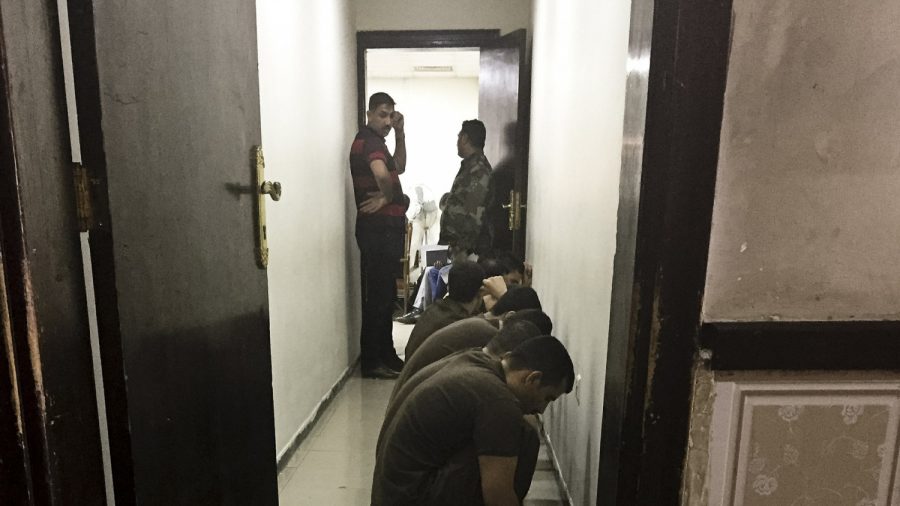An alarming confession by a captured ISIS terrorist group member reveals one of the plans they had: to attack the United States utilizing westerners and people inside the country to cause harm to financial institutions in particular.
Abu Henricki, a Canadian citizen that holds dual citizenship with Trinidad, was detained by the SDF (Syrian Democratic Forces) in Rojava, Syria, and was questioned by the ICSVE (International Center for the Study of Violent Extremism) for an hour and a half, reported hstoday.
He was recruited to fight for and serve ISIS and later was designated as unqualified to fight because of illness.
During the interaction, Abu suddenly decided to reveal something chilling to the investigators, he said it had been troubling him for some time.
“There’s something that’s kind of like was playing in the mind in the past a little while now,” he told hstoday. “I have been contacted by two organizations from the U.S. and Canada to help stop foreign attacks. The one guy in Canada wants to take me under his wing,” he explained, “Another one [the American intel] wants me to go around to people I met, Americans from Texas.”
The investigators asked him: “You met Americans in ISIS?”
Information about American ISIS members is very rare.
Henricki nodded and said “There was a Bengali American. Abu Adam.” Trying to recall the others’ names, he added, “Two cousins. They were from New York. One was American, but Turkish–Abu Ilias. He was from Texas. He was killed in Baghouz in a drone strike.”
Henricki then confessed to a plot which he said involved himself and other Trinidadians being invited to try to cross the U.S. border and commit financial attacks.
“The emni [ISIS intelligence arm] was inviting us,” he said. Then he was asked to identify the emni member who invited him. “He speaks English. He was Tunisian, maybe. I don’t know. He approached the guys, and they approached me. He didn’t come directly to me,” was his answer. This happened in at the end of 2016.
Then he began to unload the real burden that was on his mind.
“They, what they will have, what they wanted to do, basically, is they wanted to do financial attacks. Financial attacks to cripple the [U.S.] economy,” Henricki explained, “Apparently, they have the contacts or whatever papers they can get to a false ID, false passports [to send me out for this kind of attack]. They have their system of doing it. So that’s maybe the way that I could have gone out with other individuals. It wasn’t me alone. They were sending you to Puerto Rico and from Puerto Rico [to Mexico].”
“One reason while I was also put in [ISIS] prison in 2016, I was asked to leave [ISIS] to go to America because I’m from that area. Cause they wanted [and] planned to do something and I refused,” Henricki explained, “I refused to do it. That is why also I’m put into [ISIS] prison and been tortured,” he said.
“They beat me a lot. [I was] suspended from the back, standing on my toes, given no food for a few days, waterboarded—while blindfolded, and they put a bag over your head. They found nothing on me, so I was released,” Abu Henricki had explained an hour earlier.
His Canadian wife was also imprisoned because she had openly criticized ISIS, but she was not tortured. However, she heard about the agony of others who were tortured, so she suffered a psychological torture of sorts. Henricki said that his wife miscarried her pregnancy due to distress, also, he got a very serious chronic stress-related illness.
“I knew I went to prison because I said no [to their offer of an external attack mission],” Abu Henricki explained. “But they wouldn’t say that.”

“Please be advised, I was not willing to do it,” Abu Henricki added, “But this is one of their wicked, one of the plans that they had,” he said, “and which I would like to think I foiled the plan by not being part of it.”
Full details were not disclosed to him, albeit he did say that the plot was to attack the financial system.
He mentioned that he hadn’t trusted anyone enough to expose this information up to now, even though he was contacted by both U.S. and Canadian intelligence since he was detained in the SDF prison.
“I was contacted to get information to stop [active] plots,” he said, “I haven’t told anyone this information. I feel better now,” Henricki said. “I’ve been carrying that inside for a very long time and it feels good now to unburden myself of it.”
The interviewees said that they would promptly contact the FBI.
He was asked about others who had been approached to execute the evil plot.
“I think they died. I think they also refused. They were still around [inside the Caliphate], in late 2017, and then were killed, hit by airstrikes,” he said. “My Trinidadian [friends] were approached to do the same thing,” he explains. “The Trinidadians, [like me,] also refused,”
“Abu Rahman, Abu Fukai and Abu Salahi, Abu Ana—all dead. I came in [to the Caliphate] with them.”
He was asked how he knew for sure that they were dead.
“Abu Rukiah was hit by a sniper,” he responded.
Because the others were bombed, he was asked how he knows they were actually killed. “I was in the vicinity. I saw their dead bodies and went to their burials,” he confirmed.



